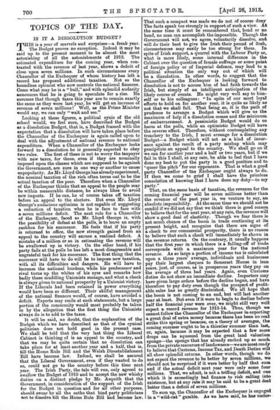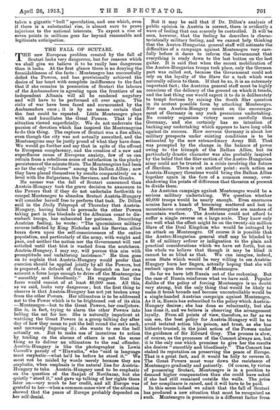TOPICS OF THE DAY.
IS IT A DISSOLUTION BUDGET?
THIS is a year of marvels and surprises—a freak year. The Budget proves no exception. Indeed it may be said up to the present moment to be almost the most astonishing of all the astonishments of 1913. The estimated expenditure for the coming year, when con- trasted with the revenue of last year, shows a deficit of close upon seven millions. In such circumstances every Chancellor of the Exchequer of whom history has left a, record has proposed additional taxation. Not so the boundless optimist who now controls the national finances. Come what may he is a "bull," and with splendid audacity announces that he is going to speculate for a rise. He assumes that though taxes this year are to remain exactly the same as they were last year, he will get an increase of revenue of seven millions ! Well, as the Prime Minister would say, we can only "wait and see."
Looking at these figures, a political cynic of the old school would, we feel sure, have described the Budget as a dissolution Budget, that is, a Budget framed with the expectation that a dissolution will have taken place before the Chancellor of the Exchequer is again called upon to deal with the adjustment of national revenue to national expenditure. When a Chancellor of the Exchequer looks forward to a dissolution he is generally expected to obey two rules. The first of these is not to worry the taxpayer with new taxes, for these, even if they are nominally imposed upon the classes which are supposed to be against the Government, are sure in one way or another to cause unpopularity. As Mr. Lloyd George has already experienced, the nominal taxation of the rich often turns out to be the actual taxation of the poor. Therefore when a Chancellor of the Exchequer thinks that an appeal to the people may be within measurable distance, he always likes to avoid new imposts. If he can, he of course takes off taxation before an appeal to the electors. But even Mr. Lloyd George's audacious optimism is not capable of suggesting a. reduction of taxation when he is face to face with a seven millions deficit. The next rule for a Chancellor of the Exchequer, faced as Mr. Lloyd George is, with the possibility of defeat at the polls, is to leave an empty cashbox for his successor. He feels that if his party is returned to office, the new strength gained from an appeal to the country will excuse a realized deficit. A mistake of a million or so in estimating the revenue will be swallowed up in victory. On the other hand, if his party fails at the polls he has left a most disagreeable and ungrateful task for his successor. The first thing that the successor will have to do will be to impose new taxation, with all its difficulties and dangers. He will have to increase the national burdens, while his predecessor and rival turns up the whites of his eyes and remarks how badly these muddling Unionists manage, and what a check is always given to national prosperity by a Unionist victory. If the Liberals had been retained in power everything would have been so different. Their skilful management of the national finances would, of course, have avoided a deficit. Experts may smile at such statements, but a large portion of the community would most probably be taken in by the allegation that the first thing the Unionists always do is to add to the taxes.
It will be said, no doubt, that the explanation of the Budget which we have described as that of the cynical politician does not hold good in the present case. We shall be told that the very last thing the Liberal Cabinet is thinking of is an appeal to the country, and that we may be quite certain that no dissolution can take place for at least another year and a half, that is, till the Home Rule Bill and the Welsh Disestablishment Bill have become law. Indeed, we shall be assured that the Liberal Government, even if they wanted to do so, could not go to the country before this time next year. The Irish Party, the tale will run, only agreed to swallow the Budget of 1910 and to accept the new whisky duties on a distinct pledge by Mr. Asquith that the Government, in consideration of the support of the Irish for the Budget in question and for all other purposes, should swear by all the oaths that bind party politicians not to dissolve till the Home Rule Bill had become law. That such a compact was made we do not of course deny The facts speak too strongly in support of such a view. At the same time it must be remembered that, bond or no bond, no man can accomplish the impossible. Though the Government will not, we agree, voluntarily dissolve, and will do their best to give the Irish their pound of flesh, circumstances may easily be too strong for them. In spite of Irish support, a quarrel with the Labour Party or, what is more likely, some internal difference in the Cabinet over the question of female suffrage or some point of foreign policy or of Imperial defence, may lead to a. political situation the only way out of which will be a dissolution. In other words, to suggest that the Chancellor of the Exchequer is looking forward to dissolution is not to accuse him of bad faith towards the Irish, but simply of an intelligent anticipation of the likely course of events. He might very well say to him- self or to his colleagues : "In spite of our most loyal efforts to hold on for another year, it is quite as likely as not that we shall fall. That being so, it is the path of prudence to arrange a Budget which will give us the maximum of help if a dissolution comes and the minimum of embarrassment. A pessimistic Budget would do us harm at the polls, while an optimistic Budget will have the reverse effect. Therefore, without contemplating any treachery to the Irish, I must arrange for a dissolution Budget—a Budget which will act as a kind of insur- ance against the result of a party mishap which may precipitate an appeal to the country. We shall go on if we can for another year and a half or two years, but if we fail in this I shall, at any rate, be able to feel that I have done my best to put the party in a good position and to queer the pitch' for our opponents. That is what a good party Chancellor of the Exchequer ought always to do. If then we come to grief I shall have the priceless consolation of knowing that I have done my duty—to my. party." That, on the same basis of taxation, the revenue for the coming financial year will be seven millions better than the revenue of the past year is, we venture to say, an absolute impossibility. At the same time we should not be candid if we did not say that we think there is good reason to believe that for the next year, at any rate, the revenue will show a good deal of elasticity. Though we fear there is not much chance of the boom in trade continuing at its present height, and recognize that there are signs of a check to our commercial prosperity, there is no reason to believe that such a check will immediately be shown in the revenue returns. On the contrary, it usually happens that the first year in which there is a falling-off of trade corresponds with a maximum year for the national revenue. As so large a, portion of income tax is calculated upon a three years' average, individuals and, businesses pay their largest cheques to Somerset House in lean years, just, of course, as in prosperous years they pay on the average of three bad years. Again, even Customs duties do not show an immediate decline. Importers may have given large orders before the decline began, and have therefore to pay duty even though the prospect of profit- able sales has so greatly diminished. We all hope that the boom is not coming to an end, but will last another year at least. But even if it were to begin to decline before half the financial year were over, we might still very well expect a record revenue for 1913-14. Thus, though we cannot follow the Chancellor of the Exchequer in expecting a great deal of extra money because there has been no coal strike this spring or because, on a theory of averages, the coming summer ought to be a thirstier summer than last, or, again, because it may be expected that a few more drops can be squeezed. from the great land valuation sponge—the sponge that has already sucked up so much from the private resources of landowners—we are most ready to believe that Customs, Income Tax, and Death Duties will all show splendid returns. In other words, though we do not expect the revenue to be better by seven millions, we should not be surprised if it were better by half that sum and if the actual deficit next year were only some four millions. That, we admit, is not a trifling deficit, and one which it is exceedingly bad finance to risk calling into existence, but at any rate it may be said to be a great deal better than a deficit of seven millions.
To sum up, the Chancellor of the Exchequer is engaged in a. " wild-cat " gamble. As we have said, he has under-. taken a gigantic " bull " speculation, and one which, even if there is a substantial rise, is almost sure to prove injurious to the national interests. To expect a rise of seven points in millions goes far beyond reasonable and legitimate anticipation.



























































 Previous page
Previous page